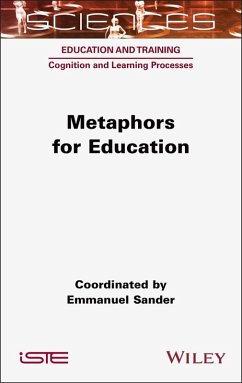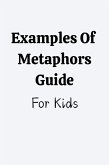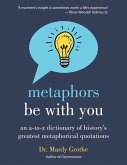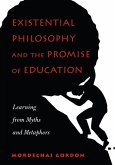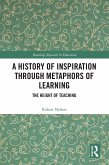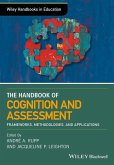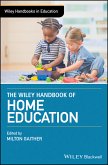Emmanuel Sander
Metaphors for Education (eBook, ePUB)
142,99 €
142,99 €
inkl. MwSt.
Sofort per Download lieferbar

0 °P sammeln
142,99 €
Als Download kaufen

142,99 €
inkl. MwSt.
Sofort per Download lieferbar

0 °P sammeln
Jetzt verschenken
Alle Infos zum eBook verschenken
142,99 €
inkl. MwSt.
Sofort per Download lieferbar
Alle Infos zum eBook verschenken

0 °P sammeln
Emmanuel Sander
Metaphors for Education (eBook, ePUB)
- Format: ePub
- Merkliste
- Auf die Merkliste
- Bewerten Bewerten
- Teilen
- Produkt teilen
- Produkterinnerung
- Produkterinnerung

Bitte loggen Sie sich zunächst in Ihr Kundenkonto ein oder registrieren Sie sich bei
bücher.de, um das eBook-Abo tolino select nutzen zu können.
Hier können Sie sich einloggen
Hier können Sie sich einloggen
Sie sind bereits eingeloggt. Klicken Sie auf 2. tolino select Abo, um fortzufahren.

Bitte loggen Sie sich zunächst in Ihr Kundenkonto ein oder registrieren Sie sich bei bücher.de, um das eBook-Abo tolino select nutzen zu können.
Metaphors are more than just linguistic tools; they go far beyond this. By drawing on the known to illuminate the unknown, they shape understanding and profoundly influence learning dynamics, making them particularly relevant in education. Metaphors for Education explores this theme in depth, offering a comprehensive and enlightening overview of the role and place of metaphors in the field of education. The book examines how metaphors shape pedagogical approaches and conceptions of teaching, and influence learning processes and conceptual development, as well as impact assessment,…mehr
- Geräte: eReader
- mit Kopierschutz
- eBook Hilfe
- Größe: 0.64MB
Andere Kunden interessierten sich auch für
![Examples Of Metaphors Guide (eBook, ePUB) Examples Of Metaphors Guide (eBook, ePUB)]() Shanay GenganExamples Of Metaphors Guide (eBook, ePUB)4,49 €
Shanay GenganExamples Of Metaphors Guide (eBook, ePUB)4,49 €![Metaphors Be With You (eBook, ePUB) Metaphors Be With You (eBook, ePUB)]() Mardy GrotheMetaphors Be With You (eBook, ePUB)9,99 €
Mardy GrotheMetaphors Be With You (eBook, ePUB)9,99 €![Existential Philosophy and the Promise of Education (eBook, ePUB) Existential Philosophy and the Promise of Education (eBook, ePUB)]() Mordechai GordonExistential Philosophy and the Promise of Education (eBook, ePUB)35,95 €
Mordechai GordonExistential Philosophy and the Promise of Education (eBook, ePUB)35,95 €![A History of Inspiration through Metaphors of Learning (eBook, ePUB) A History of Inspiration through Metaphors of Learning (eBook, ePUB)]() Robert NelsonA History of Inspiration through Metaphors of Learning (eBook, ePUB)39,95 €
Robert NelsonA History of Inspiration through Metaphors of Learning (eBook, ePUB)39,95 €![New Teacher Mindset (eBook, ePUB) New Teacher Mindset (eBook, ePUB)]() Trevor MuirNew Teacher Mindset (eBook, ePUB)19,99 €
Trevor MuirNew Teacher Mindset (eBook, ePUB)19,99 €![The Wiley Handbook of Cognition and Assessment (eBook, ePUB) The Wiley Handbook of Cognition and Assessment (eBook, ePUB)]() The Wiley Handbook of Cognition and Assessment (eBook, ePUB)177,99 €
The Wiley Handbook of Cognition and Assessment (eBook, ePUB)177,99 €![The Wiley Handbook of Home Education (eBook, ePUB) The Wiley Handbook of Home Education (eBook, ePUB)]() The Wiley Handbook of Home Education (eBook, ePUB)171,99 €
The Wiley Handbook of Home Education (eBook, ePUB)171,99 €-
-
-
Metaphors are more than just linguistic tools; they go far beyond this. By drawing on the known to illuminate the unknown, they shape understanding and profoundly influence learning dynamics, making them particularly relevant in education. Metaphors for Education explores this theme in depth, offering a comprehensive and enlightening overview of the role and place of metaphors in the field of education. The book examines how metaphors shape pedagogical approaches and conceptions of teaching, and influence learning processes and conceptual development, as well as impact assessment, differentiation and the professional identity of teachers. It also shows how metaphors can provide powerful tools for reflection and transformation in educational practices. Aimed at teachers, students, educational researchers and enthusiasts alike, this book offers fresh and stimulating perspectives on the contribution of metaphors to learning and teaching.
Dieser Download kann aus rechtlichen Gründen nur mit Rechnungsadresse in D ausgeliefert werden.
Produktdetails
- Produktdetails
- Verlag: John Wiley & Sons
- Seitenzahl: 280
- Erscheinungstermin: 11. Juli 2025
- Englisch
- ISBN-13: 9781394393688
- Artikelnr.: 74895231
- Verlag: John Wiley & Sons
- Seitenzahl: 280
- Erscheinungstermin: 11. Juli 2025
- Englisch
- ISBN-13: 9781394393688
- Artikelnr.: 74895231
- Herstellerkennzeichnung Die Herstellerinformationen sind derzeit nicht verfügbar.
Emmanuel Sander is a professor at the Faculty of Psychology and Educational Sciences at the University of Geneva, Switzerland, in the field of School-based Intervention: Learning and Development, where he heads the IDEA (instruction, développement, éducation, apprentissage) laboratory.
Introduction xi
Emmanuel SANDER
Part 1. Comparative Perspectives on Metaphors in Education 1
Chapter 1. Successes and Setbacks of Metaphors in Education 3
Emmanuel SANDER, Joanna BLOCHOWIAK and Yves GERBER
1.1. Introduction 3
1.2. The metaphoricity of antimetaphorics 5
1.3. The interpretive approach, the need to trust metaphors 8
1.4. Cognitive approaches to metaphor 11
1.4.1. Traditional approaches to metaphor 12
1.4.2. Contemporary approaches 14
1.5. Metaphorical uses by the great figures in education 21
1.6. Conclusion 26
1.7. References 28
Chapter 2. Metaphor: The Anchor and Driver of Conceptual Development 33
Emmanuel SANDER, Laura LEON PEREZ, Yves GERBER and Catherine RIVIER
2.1. Introduction 33
2.2. Beyond the classical approach to concepts: concepts have a heart 37
2.2.1. The classical approach to concepts: concepts as boxes 37
2.2.2. Prototypes at the heart of concepts 39
2.2.3. Abstract concept prototypes 40
2.3. School-taught or not, concepts out of boxes 43
2.3.1. Metaphors: props, obstacles and springboards for learning 44
2.3.2. The metaphors of arithmetical notions 46
2.4. Conceptual development from a lifespan perspective 49
2.4.1. Concepts developing throughout life 49
2.4.2. At the origin of the Mother Earth metaphor, a rise in abstraction 51
2.4.3. Some living things more living than others 53
2.5. Supporting conceptual development 55
2.5.1. Semantic recoding 55
2.5.2. Metaphorical framing in support of semantic recoding 58
2.6. Conclusion 62
2.7. References 64
Chapter 3. Teaching Metaphors and Pedagogical Conceptions 75
Katarina GVOZDIC and Catherine RIVIER
3.1. Introduction 75
3.2. Metaphorical collusions rich in inferences 77
3.2.1. Metaphors of teaching 77
3.2.2. Different metaphors, different inferences 79
3.3. The conceptions underlying teaching metaphors 82
3.3.1. Metaphors of transmission and participation 82
3.3.2. An intuitive conception of teaching 84
3.4. Not so dichotomous pedagogical practices 86
3.4.1. Pedagogies inspired by explicit instruction 87
3.4.2. The so-called "active" pedagogies 88
3.5. Metaphor as a driving force of transformation in teaching 91
3.5.1. An evolution in conceptions 92
3.5.2. Adapting one's teaching 94
3.6. Conclusion 95
3.7. References 97
Part 2. The Transformative Potential of Metaphors in Educational Practices
103
Chapter 4. Metaphors of Assessment Practices: The Diversity and Evolution
of Teachers' Evaluative Stances 105
Katarina GVOZDIC, Stéphanie NAUD and Walther TESSARO
4.1. Introduction 105
4.2. Classroom assessment practices: from measurement to professional
judgment 107
4.2.1. A problematic subjectivity 107
4.2.2. An assumed subjectivity 109
4.3. The teacher's assessment activity seen through metaphors 112
4.4. Investigating assessment stances in preservice teachers 115
4.4.1. Presentation of the study 116
4.4.2. Results 118
4.4.3. Perspectives 120
4.5. Conclusion 121
4.6. References 123
Chapter 5. Differentiation Through the Lens of Metaphors 131
Stéphanie NAUD
5.1. Introduction 131
5.2. Differentiation: an extended conceptual framework 134
5.2.1. Differentiation and educational justice 134
5.2.2. Student diversity or heterogeneity 139
5.2.3. Conceptions of difference and of intelligence 142
5.3. Metaphors of differentiation practices 145
5.3.1. Applicationist approach versus regulatory approach 145
5.3.2. Scaffolding: a form of regulation with multiple metaphorical sources
148
5.4. Deviation and change of course 151
5.5. Conclusion 155
5.6. References 157
Chapter 6. Metaphors for Developing Teacher Professional Identity 169
Géry MARCOUX and Nilima CHANGKAKOTI
6.1. Introduction 169
6.2. Thinking about and developing the teacher's professional identity 172
6.2.1. An identity under construction 172
6.2.2. Identity tensions and strategies for preservation or transformation
173
6.2.3. Roles inseparable from identity 174
6.3. Methods designed to understand and support the development of
teachers' professional identity 175
6.3.1. Metaphors about in-service teachers 176
6.3.2. Metaphors in teacher training 177
6.3.3. Evaluation of two proven methods to understand the complexity of the
profession 184
6.4. Conclusion 187
6.5. References 189
Chapter 7. Metaphors and Reflective Practice in Teaching 195
Yves GERBER and Géry MARCOUX
7.1. Introduction 195
7.2. Addressing professional complexity through reflexivity 197
7.3. Metaphors: tools for reflexivity 199
7.3.1. Formats promoting reflection 199
7.3.2. Levels, or thresholds of reflexivity 200
7.3.3. Use of metaphors in sustaining reflective practice 201
7.3.4. Models conducive to the use of metaphors 203
7.4. Using metaphors in order to develop reflexivity 206
7.4.1. Analyzing metaphors 207
7.4.2. Generating metaphors 207
7.4.3. Proposing metaphors 210
7.4.4. Comparing two metaphors 211
7.4.5. Implementation and limits of metaphorical usages for the development
of reflexivity 211
7.5. Conclusion 213
7.6. References 214
List of Authors 221
Index 223
Emmanuel SANDER
Part 1. Comparative Perspectives on Metaphors in Education 1
Chapter 1. Successes and Setbacks of Metaphors in Education 3
Emmanuel SANDER, Joanna BLOCHOWIAK and Yves GERBER
1.1. Introduction 3
1.2. The metaphoricity of antimetaphorics 5
1.3. The interpretive approach, the need to trust metaphors 8
1.4. Cognitive approaches to metaphor 11
1.4.1. Traditional approaches to metaphor 12
1.4.2. Contemporary approaches 14
1.5. Metaphorical uses by the great figures in education 21
1.6. Conclusion 26
1.7. References 28
Chapter 2. Metaphor: The Anchor and Driver of Conceptual Development 33
Emmanuel SANDER, Laura LEON PEREZ, Yves GERBER and Catherine RIVIER
2.1. Introduction 33
2.2. Beyond the classical approach to concepts: concepts have a heart 37
2.2.1. The classical approach to concepts: concepts as boxes 37
2.2.2. Prototypes at the heart of concepts 39
2.2.3. Abstract concept prototypes 40
2.3. School-taught or not, concepts out of boxes 43
2.3.1. Metaphors: props, obstacles and springboards for learning 44
2.3.2. The metaphors of arithmetical notions 46
2.4. Conceptual development from a lifespan perspective 49
2.4.1. Concepts developing throughout life 49
2.4.2. At the origin of the Mother Earth metaphor, a rise in abstraction 51
2.4.3. Some living things more living than others 53
2.5. Supporting conceptual development 55
2.5.1. Semantic recoding 55
2.5.2. Metaphorical framing in support of semantic recoding 58
2.6. Conclusion 62
2.7. References 64
Chapter 3. Teaching Metaphors and Pedagogical Conceptions 75
Katarina GVOZDIC and Catherine RIVIER
3.1. Introduction 75
3.2. Metaphorical collusions rich in inferences 77
3.2.1. Metaphors of teaching 77
3.2.2. Different metaphors, different inferences 79
3.3. The conceptions underlying teaching metaphors 82
3.3.1. Metaphors of transmission and participation 82
3.3.2. An intuitive conception of teaching 84
3.4. Not so dichotomous pedagogical practices 86
3.4.1. Pedagogies inspired by explicit instruction 87
3.4.2. The so-called "active" pedagogies 88
3.5. Metaphor as a driving force of transformation in teaching 91
3.5.1. An evolution in conceptions 92
3.5.2. Adapting one's teaching 94
3.6. Conclusion 95
3.7. References 97
Part 2. The Transformative Potential of Metaphors in Educational Practices
103
Chapter 4. Metaphors of Assessment Practices: The Diversity and Evolution
of Teachers' Evaluative Stances 105
Katarina GVOZDIC, Stéphanie NAUD and Walther TESSARO
4.1. Introduction 105
4.2. Classroom assessment practices: from measurement to professional
judgment 107
4.2.1. A problematic subjectivity 107
4.2.2. An assumed subjectivity 109
4.3. The teacher's assessment activity seen through metaphors 112
4.4. Investigating assessment stances in preservice teachers 115
4.4.1. Presentation of the study 116
4.4.2. Results 118
4.4.3. Perspectives 120
4.5. Conclusion 121
4.6. References 123
Chapter 5. Differentiation Through the Lens of Metaphors 131
Stéphanie NAUD
5.1. Introduction 131
5.2. Differentiation: an extended conceptual framework 134
5.2.1. Differentiation and educational justice 134
5.2.2. Student diversity or heterogeneity 139
5.2.3. Conceptions of difference and of intelligence 142
5.3. Metaphors of differentiation practices 145
5.3.1. Applicationist approach versus regulatory approach 145
5.3.2. Scaffolding: a form of regulation with multiple metaphorical sources
148
5.4. Deviation and change of course 151
5.5. Conclusion 155
5.6. References 157
Chapter 6. Metaphors for Developing Teacher Professional Identity 169
Géry MARCOUX and Nilima CHANGKAKOTI
6.1. Introduction 169
6.2. Thinking about and developing the teacher's professional identity 172
6.2.1. An identity under construction 172
6.2.2. Identity tensions and strategies for preservation or transformation
173
6.2.3. Roles inseparable from identity 174
6.3. Methods designed to understand and support the development of
teachers' professional identity 175
6.3.1. Metaphors about in-service teachers 176
6.3.2. Metaphors in teacher training 177
6.3.3. Evaluation of two proven methods to understand the complexity of the
profession 184
6.4. Conclusion 187
6.5. References 189
Chapter 7. Metaphors and Reflective Practice in Teaching 195
Yves GERBER and Géry MARCOUX
7.1. Introduction 195
7.2. Addressing professional complexity through reflexivity 197
7.3. Metaphors: tools for reflexivity 199
7.3.1. Formats promoting reflection 199
7.3.2. Levels, or thresholds of reflexivity 200
7.3.3. Use of metaphors in sustaining reflective practice 201
7.3.4. Models conducive to the use of metaphors 203
7.4. Using metaphors in order to develop reflexivity 206
7.4.1. Analyzing metaphors 207
7.4.2. Generating metaphors 207
7.4.3. Proposing metaphors 210
7.4.4. Comparing two metaphors 211
7.4.5. Implementation and limits of metaphorical usages for the development
of reflexivity 211
7.5. Conclusion 213
7.6. References 214
List of Authors 221
Index 223
Introduction xi
Emmanuel SANDER
Part 1. Comparative Perspectives on Metaphors in Education 1
Chapter 1. Successes and Setbacks of Metaphors in Education 3
Emmanuel SANDER, Joanna BLOCHOWIAK and Yves GERBER
1.1. Introduction 3
1.2. The metaphoricity of antimetaphorics 5
1.3. The interpretive approach, the need to trust metaphors 8
1.4. Cognitive approaches to metaphor 11
1.4.1. Traditional approaches to metaphor 12
1.4.2. Contemporary approaches 14
1.5. Metaphorical uses by the great figures in education 21
1.6. Conclusion 26
1.7. References 28
Chapter 2. Metaphor: The Anchor and Driver of Conceptual Development 33
Emmanuel SANDER, Laura LEON PEREZ, Yves GERBER and Catherine RIVIER
2.1. Introduction 33
2.2. Beyond the classical approach to concepts: concepts have a heart 37
2.2.1. The classical approach to concepts: concepts as boxes 37
2.2.2. Prototypes at the heart of concepts 39
2.2.3. Abstract concept prototypes 40
2.3. School-taught or not, concepts out of boxes 43
2.3.1. Metaphors: props, obstacles and springboards for learning 44
2.3.2. The metaphors of arithmetical notions 46
2.4. Conceptual development from a lifespan perspective 49
2.4.1. Concepts developing throughout life 49
2.4.2. At the origin of the Mother Earth metaphor, a rise in abstraction 51
2.4.3. Some living things more living than others 53
2.5. Supporting conceptual development 55
2.5.1. Semantic recoding 55
2.5.2. Metaphorical framing in support of semantic recoding 58
2.6. Conclusion 62
2.7. References 64
Chapter 3. Teaching Metaphors and Pedagogical Conceptions 75
Katarina GVOZDIC and Catherine RIVIER
3.1. Introduction 75
3.2. Metaphorical collusions rich in inferences 77
3.2.1. Metaphors of teaching 77
3.2.2. Different metaphors, different inferences 79
3.3. The conceptions underlying teaching metaphors 82
3.3.1. Metaphors of transmission and participation 82
3.3.2. An intuitive conception of teaching 84
3.4. Not so dichotomous pedagogical practices 86
3.4.1. Pedagogies inspired by explicit instruction 87
3.4.2. The so-called "active" pedagogies 88
3.5. Metaphor as a driving force of transformation in teaching 91
3.5.1. An evolution in conceptions 92
3.5.2. Adapting one's teaching 94
3.6. Conclusion 95
3.7. References 97
Part 2. The Transformative Potential of Metaphors in Educational Practices
103
Chapter 4. Metaphors of Assessment Practices: The Diversity and Evolution
of Teachers' Evaluative Stances 105
Katarina GVOZDIC, Stéphanie NAUD and Walther TESSARO
4.1. Introduction 105
4.2. Classroom assessment practices: from measurement to professional
judgment 107
4.2.1. A problematic subjectivity 107
4.2.2. An assumed subjectivity 109
4.3. The teacher's assessment activity seen through metaphors 112
4.4. Investigating assessment stances in preservice teachers 115
4.4.1. Presentation of the study 116
4.4.2. Results 118
4.4.3. Perspectives 120
4.5. Conclusion 121
4.6. References 123
Chapter 5. Differentiation Through the Lens of Metaphors 131
Stéphanie NAUD
5.1. Introduction 131
5.2. Differentiation: an extended conceptual framework 134
5.2.1. Differentiation and educational justice 134
5.2.2. Student diversity or heterogeneity 139
5.2.3. Conceptions of difference and of intelligence 142
5.3. Metaphors of differentiation practices 145
5.3.1. Applicationist approach versus regulatory approach 145
5.3.2. Scaffolding: a form of regulation with multiple metaphorical sources
148
5.4. Deviation and change of course 151
5.5. Conclusion 155
5.6. References 157
Chapter 6. Metaphors for Developing Teacher Professional Identity 169
Géry MARCOUX and Nilima CHANGKAKOTI
6.1. Introduction 169
6.2. Thinking about and developing the teacher's professional identity 172
6.2.1. An identity under construction 172
6.2.2. Identity tensions and strategies for preservation or transformation
173
6.2.3. Roles inseparable from identity 174
6.3. Methods designed to understand and support the development of
teachers' professional identity 175
6.3.1. Metaphors about in-service teachers 176
6.3.2. Metaphors in teacher training 177
6.3.3. Evaluation of two proven methods to understand the complexity of the
profession 184
6.4. Conclusion 187
6.5. References 189
Chapter 7. Metaphors and Reflective Practice in Teaching 195
Yves GERBER and Géry MARCOUX
7.1. Introduction 195
7.2. Addressing professional complexity through reflexivity 197
7.3. Metaphors: tools for reflexivity 199
7.3.1. Formats promoting reflection 199
7.3.2. Levels, or thresholds of reflexivity 200
7.3.3. Use of metaphors in sustaining reflective practice 201
7.3.4. Models conducive to the use of metaphors 203
7.4. Using metaphors in order to develop reflexivity 206
7.4.1. Analyzing metaphors 207
7.4.2. Generating metaphors 207
7.4.3. Proposing metaphors 210
7.4.4. Comparing two metaphors 211
7.4.5. Implementation and limits of metaphorical usages for the development
of reflexivity 211
7.5. Conclusion 213
7.6. References 214
List of Authors 221
Index 223
Emmanuel SANDER
Part 1. Comparative Perspectives on Metaphors in Education 1
Chapter 1. Successes and Setbacks of Metaphors in Education 3
Emmanuel SANDER, Joanna BLOCHOWIAK and Yves GERBER
1.1. Introduction 3
1.2. The metaphoricity of antimetaphorics 5
1.3. The interpretive approach, the need to trust metaphors 8
1.4. Cognitive approaches to metaphor 11
1.4.1. Traditional approaches to metaphor 12
1.4.2. Contemporary approaches 14
1.5. Metaphorical uses by the great figures in education 21
1.6. Conclusion 26
1.7. References 28
Chapter 2. Metaphor: The Anchor and Driver of Conceptual Development 33
Emmanuel SANDER, Laura LEON PEREZ, Yves GERBER and Catherine RIVIER
2.1. Introduction 33
2.2. Beyond the classical approach to concepts: concepts have a heart 37
2.2.1. The classical approach to concepts: concepts as boxes 37
2.2.2. Prototypes at the heart of concepts 39
2.2.3. Abstract concept prototypes 40
2.3. School-taught or not, concepts out of boxes 43
2.3.1. Metaphors: props, obstacles and springboards for learning 44
2.3.2. The metaphors of arithmetical notions 46
2.4. Conceptual development from a lifespan perspective 49
2.4.1. Concepts developing throughout life 49
2.4.2. At the origin of the Mother Earth metaphor, a rise in abstraction 51
2.4.3. Some living things more living than others 53
2.5. Supporting conceptual development 55
2.5.1. Semantic recoding 55
2.5.2. Metaphorical framing in support of semantic recoding 58
2.6. Conclusion 62
2.7. References 64
Chapter 3. Teaching Metaphors and Pedagogical Conceptions 75
Katarina GVOZDIC and Catherine RIVIER
3.1. Introduction 75
3.2. Metaphorical collusions rich in inferences 77
3.2.1. Metaphors of teaching 77
3.2.2. Different metaphors, different inferences 79
3.3. The conceptions underlying teaching metaphors 82
3.3.1. Metaphors of transmission and participation 82
3.3.2. An intuitive conception of teaching 84
3.4. Not so dichotomous pedagogical practices 86
3.4.1. Pedagogies inspired by explicit instruction 87
3.4.2. The so-called "active" pedagogies 88
3.5. Metaphor as a driving force of transformation in teaching 91
3.5.1. An evolution in conceptions 92
3.5.2. Adapting one's teaching 94
3.6. Conclusion 95
3.7. References 97
Part 2. The Transformative Potential of Metaphors in Educational Practices
103
Chapter 4. Metaphors of Assessment Practices: The Diversity and Evolution
of Teachers' Evaluative Stances 105
Katarina GVOZDIC, Stéphanie NAUD and Walther TESSARO
4.1. Introduction 105
4.2. Classroom assessment practices: from measurement to professional
judgment 107
4.2.1. A problematic subjectivity 107
4.2.2. An assumed subjectivity 109
4.3. The teacher's assessment activity seen through metaphors 112
4.4. Investigating assessment stances in preservice teachers 115
4.4.1. Presentation of the study 116
4.4.2. Results 118
4.4.3. Perspectives 120
4.5. Conclusion 121
4.6. References 123
Chapter 5. Differentiation Through the Lens of Metaphors 131
Stéphanie NAUD
5.1. Introduction 131
5.2. Differentiation: an extended conceptual framework 134
5.2.1. Differentiation and educational justice 134
5.2.2. Student diversity or heterogeneity 139
5.2.3. Conceptions of difference and of intelligence 142
5.3. Metaphors of differentiation practices 145
5.3.1. Applicationist approach versus regulatory approach 145
5.3.2. Scaffolding: a form of regulation with multiple metaphorical sources
148
5.4. Deviation and change of course 151
5.5. Conclusion 155
5.6. References 157
Chapter 6. Metaphors for Developing Teacher Professional Identity 169
Géry MARCOUX and Nilima CHANGKAKOTI
6.1. Introduction 169
6.2. Thinking about and developing the teacher's professional identity 172
6.2.1. An identity under construction 172
6.2.2. Identity tensions and strategies for preservation or transformation
173
6.2.3. Roles inseparable from identity 174
6.3. Methods designed to understand and support the development of
teachers' professional identity 175
6.3.1. Metaphors about in-service teachers 176
6.3.2. Metaphors in teacher training 177
6.3.3. Evaluation of two proven methods to understand the complexity of the
profession 184
6.4. Conclusion 187
6.5. References 189
Chapter 7. Metaphors and Reflective Practice in Teaching 195
Yves GERBER and Géry MARCOUX
7.1. Introduction 195
7.2. Addressing professional complexity through reflexivity 197
7.3. Metaphors: tools for reflexivity 199
7.3.1. Formats promoting reflection 199
7.3.2. Levels, or thresholds of reflexivity 200
7.3.3. Use of metaphors in sustaining reflective practice 201
7.3.4. Models conducive to the use of metaphors 203
7.4. Using metaphors in order to develop reflexivity 206
7.4.1. Analyzing metaphors 207
7.4.2. Generating metaphors 207
7.4.3. Proposing metaphors 210
7.4.4. Comparing two metaphors 211
7.4.5. Implementation and limits of metaphorical usages for the development
of reflexivity 211
7.5. Conclusion 213
7.6. References 214
List of Authors 221
Index 223
